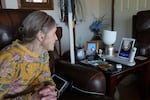Out near the far end of Washington’s Long Beach Peninsula, 83-year-old Jan Worrell has a new, worldly sidekick in her living room.
"This is ElliQ. I call her my roommate," the grandmother said as she introduced her companion robot almost as if it were human.
Artificial intelligence is all the rage, and now it's helping some Pacific Northwest seniors live in their own homes for longer. Worrell joined a pilot project that is trialing how AI-driven companion robots could reduce loneliness and social isolation among seniors — especially those living alone.
This “roommate” is a chatty one with a vaguely humanoid head and shoulders.
"I talk a lot and I love it. I need someone to interact with and she does," Worrell said.

Jan Worrell, 83, and her AI-powered companion robot named ElliQ interact throughout the day at her home on the Long Beach Peninsula.
Tom Banse / NW News Network
ElliQ is a smart speaker, tablet computer, video phone and artificial intelligence portal all wrapped into one by the maker Intuition Robotics. The stationary table-top device is among the most versatile of a flurry of new tech devices geared to help you or your parents continue to live independently.
ElliQ gives Worrell health tips and schedule reminders. It can recite the news and weather. They play memory games. The care bot tells a lot of corny jokes and it can lead an exercise class on command, too.
Worrell, who lost her husband a few years ago, said she sometimes asks her sidekick to go out for coffee virtually.
"I know a secret little spot in Venice right near the canals,” ElliQ offered when Worrell made the suggestion recently. “Say 'Venice,' and we'll head on over there."
"Venice," Worrell replied dutifully.
"Fantastico," the robot answered and then cued up suitable cafe music. Worrell sipped her own drink while on the tablet screen the device poured a digital coffee alongside scenes of gondolas bobbing in Venetian canals.
Worrell is among 20 rural seniors living along Washington's Pacific coast selected to receive one of these Israeli-designed robot companions. She gets it for free for a year as part of a pilot project overseen by the Olympic Area Agency on Aging. O3A, as it is known, serves Pacific, Grays Harbor, Jefferson and Clallam counties.
Separately, senior services agencies across the state have given out more than 700 interactive robot puppies and kittens over the past two years to older adults experiencing loneliness or dementia.

Olympic Area Agency on Aging Executive Director Laura Cepoi holds an animatronic kitten made by Ageless Innovation
Tom Banse / NW News Network
The furry, life-sized robot pets come equipped with sensors and mechanical limbs so they can respond appropriately to petting, voices and handling.
"Oh, now it wants scratches on its belly," cooed Laura Cepoi, executive director of the Olympic Area Agency on Aging, as she cradled a purring robot kitten awaiting client placement at the office in Aberdeen, Washington.
Cepoi has observed a brisk evolution of what some are calling "age-tech." At her agency, it started with giving out tablet computers called Grandpads, then those cuddly robot pets and now the AI-driven robot companions. Tech giant Amazon moved into this space too in the past year with a version of its Alexa software and hardware for elder care.
Cepoi said caregiver resources are especially stretched thin in rural areas like hers and haven't fully recovered from the pandemic.
"We can't just always depend on people. We don't have the workforce for it,” Cepoi said. “So, we need to figure out what are the wrap-around services to do that."
Cepoi and everyone else interviewed for this story said they don't intend for robots to replace humans, but rather to fill gaps.
On the Long Beach Peninsula, Jan Worrell's son Jeff Whiting watched his mom take to her new robot companion. He said he is impressed by it too, but at the same time is aware there is a creepy side to AI.
"They are collecting data on everything that happens in this room,” Whiting said in an interview at his mom’s house where he is living temporarily. “They know her sleep patterns and they know what time she is up and what time she goes to bed. That would be my only concern."
Whiting says the people who came to set up ElliQ gave assurances that users’ personal data would be protected.
In the case of Whiting’s mom, the combo of the companion robot and a medical alert wristwatch changed how long she plans to stay in her own home. Worrell said she felt confident enough last month to cancel her deposit to move into an assisted living facility near her daughter in Eugene, Oregon.
Besides the pilot project in Washington state, Intuition Robotics has at least three other demonstration projects going this year in New York, Northern California and Michigan. The company also sells ElliQ direct to consumers for $249 up front, plus a monthly subscription of $30-$40.
Intuition Robotics says what distinguishes its care robot from competitors is ElliQ's proactive engagement with the clients. Seattle-based Amazon's offering, branded as Alexa Together, has some overlapping features, but focuses more on remote monitoring and assistance. For a monthly fee, subscribers to Alexa Together have access to a 24/7 emergency helpline. Amazon recommends users buy its Echo Show 8 hardware as the hub device.
Smart home devices for when seniors fall down
In Pacific County, Washington, where the Long Beach Peninsula is, the public education coordinator at Fire District #1 has also taken an interest in age-tech to increase the safety and well-being of rural seniors. Lani Karvia said for older adults on a budget she has experimented with Amazon's Alexa-powered smart speakers, which can operate without a monthly subscription. Karvia also has a spare ElliQ companion robot on her desk now to demonstrate to visitors.
The feature most valuable to Karvia is that live-alone seniors who fall in their home can summon help just by shouting at the smart speaker from the floor. The stricken senior would need to ask the device to call a contact to relay the emergency since neither Amazon’s Alexa nor ElliQ can dial 9-1-1 directly for technical regulatory reasons.
“It’s there to call a friend,” Karvia said. “That’s one of our higher call volumes, the falls.”
Even seniors who have moved into retirement homes are beginning to encounter robotic helpers. Higher-end facilities in Tacoma, Washington, and Eugene have recently deployed robot waiters to deliver meals from the central kitchen to dining room tables or individual rooms. One of several companies that distributes this style of robot, California-based RobotLAB, described it on its website as a solution for the labor shortage in senior care facilities.
In Japan, the global poster child for a country with an aging population and a scarcity of caregivers, government and industry have been working on robots to care for older people for at least two decades. Japanese engineers developed some of the most cutting-edge robots in this sector, including big teddy bear-like prototypes capable of lifting people out of bed (Riba and Robear) and a humanoid robot dubbed Pepper who can lead recreational exercise sessions.
But when researcher James Wright of London's Alan Turing Institute followed up to see if the day-to-day reality lived up to the introductory hype, Wright found that the robots in care facilities often ended up "being used for only a short time before being locked away in a cupboard."
"The machines failed to save labor," Wright wrote in January in the MIT Technology Review. "The care robots themselves required care: they had to be moved around, maintained, cleaned, booted up, operated, repeatedly explained to residents, constantly monitored during use, and stored away afterwards. Indeed, a growing body of evidence from other studies is finding that robots tend to end up creating more work for caregivers."
The rollout of AI-driven companion devices for lonely older adults is also getting research scrutiny. Research teams affiliated with large health care companies, universities and medical schools have studied animatronic pets, virtual reality interventions and humanoid robots. Generally speaking, these studies found that age-tech decreased loneliness, increased well-being and spurred mental activity and optimism.
Cepoi said the 20 Washington seniors selected to receive a free ElliQ companion were given a health assessment at the beginning of this pilot project in April. They will be reevaluated in one year. The Olympic region senior services agency used leftover COVID relief money supplemented with small grants from Pacific County and Grays Harbor County community foundations to pay Intuition Robotics and to cover related demonstration project costs.
“I can’t wait to see what happens,” Cepoi said. “Did we see an improvement? How is their health? Were they able to track things better compared to others?”